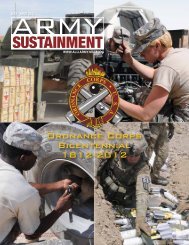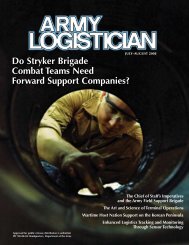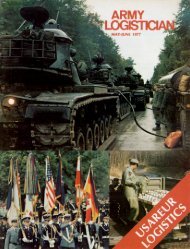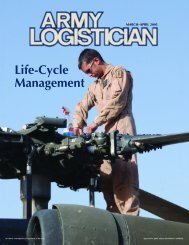Medical Logistics - Army Logistics University - U.S. Army
Medical Logistics - Army Logistics University - U.S. Army
Medical Logistics - Army Logistics University - U.S. Army
You also want an ePaper? Increase the reach of your titles
YUMPU automatically turns print PDFs into web optimized ePapers that Google loves.
Techniques for Success<br />
Adhering to the tenets of multinational<br />
operations in Joint Publication<br />
3–16, Multinational Operations, was<br />
critical to our success in Afghanistan.<br />
Although the manual is written<br />
from the perspective of working<br />
with allies in a joint and multinational<br />
campaign, we applied it to<br />
our role as mentors to the ANA.<br />
Respect, rapport, knowledge of partners,<br />
patience, and making the most<br />
of interpreters proved to be keys to<br />
our success.<br />
Respect. Respecting our Afghan<br />
colleagues came from seeking to<br />
understand their culture, history,<br />
religion, values, and customs. Since<br />
very little of this knowledge was<br />
provided in a formal educational<br />
setting, we gained it through extensive<br />
reading and experience. I read<br />
a multitude of books exposing me to<br />
Islam and Afghanistan’s rich history<br />
and culture. For example, I learned<br />
that proverbs and metaphors are<br />
valued in Afghan society because<br />
of their simple conveyance of a<br />
deep idea or thought. In the West,<br />
we tend to marginalize proverbs<br />
as simple, but when one masters a<br />
proverb in Dari, the world is open<br />
to his influence. Understanding and<br />
a healthy dose of mutual respect go<br />
ARMY LOGISTICIAN PROFESSIONAL BULLETIN OF UNITED STATES ARMY LOGISTICS<br />
a long way toward creating an environment where partners<br />
can achieve great things. When U.S. mentors have<br />
disdain for their Afghan colleagues, it is often evident<br />
in their lack of mission achievement.<br />
Rapport. Building rapport is an investment and<br />
therefore takes times. Greeting with a kiss and humble<br />
hand to the heart allowed me to gain the confidence of<br />
many Afghans. Family is very important to Afghans,<br />
so I showed them pictures of my immediate and<br />
extended family and inquired about theirs during our<br />
first conversations. Small talk over several cups of<br />
chai tea built a foundation for future dialogue. The<br />
teamwork that ensued was invaluable to our mutual<br />
accomplishments.<br />
Knowledge of partners. Just as a good leader should<br />
know himself and a good commander should know<br />
his enemy, a good mentor should know his partners.<br />
Our Afghan brothers were part of our team. We sought<br />
to use their knowledge and cultural views to help us<br />
accomplish missions. Understanding their perspective<br />
and abilities allowed us to concentrate our efforts to<br />
produce effects with the most long-term benefits.<br />
Patience. Patience is a required skill in mentoring<br />
Afghan soldiers. In general, Americans tend to be very<br />
results-oriented and expect immediate gratification—<br />
in essence, impatient. One could easily tell that our<br />
Afghan colleagues did not operate with a sense of<br />
urgency. Their work habits were developed within their<br />
cultural views, not ours. Yes, the Americans probably<br />
could have quickly produced near-perfect products<br />
by doing it themselves, but that was not the point.<br />
Since everything we did was designed to mold a selfsufficient<br />
organization, it had to be a group effort. And<br />
partnerships take time to develop.<br />
A Soldier teaches a class at the <strong>Medical</strong> Stocks Command headquarters.<br />
27







